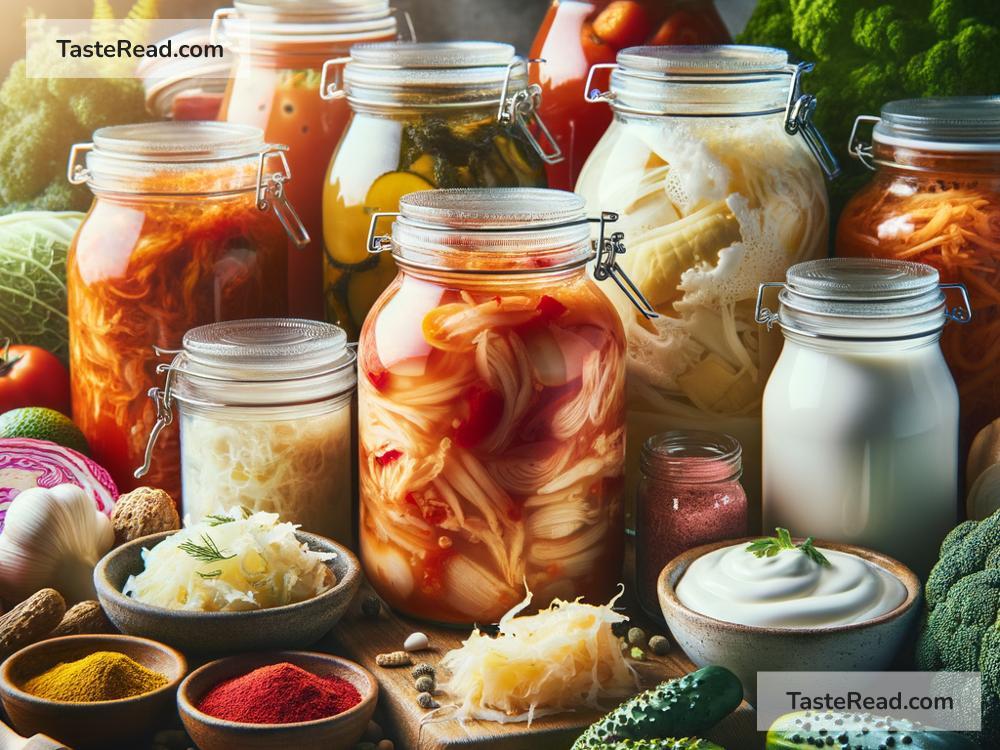The Science of Food Fermentation: Probiotic Benefits Explained Simply
Have you ever enjoyed yogurt, pickles, or sourdough bread and wondered how they’re made? These delicious foods are products of an incredible process called fermentation. While fermentation has been used for thousands of years to preserve food and enhance flavor, it’s also gaining attention for its probiotic benefits that can improve your health. Let’s dive into the science of food fermentation in simple terms and explore how it helps your body.
What Is Fermentation?
Fermentation is a natural process where microorganisms—like bacteria, yeast, and fungi—break down food components, such as sugars and starches. These tiny organisms turn these components into other substances, such as acids, gases, or alcohol. This transformation not only changes the flavor, texture, and aroma of food but also helps preserve it, making it last longer without spoiling.
For example:
– In yogurt, bacteria ferment the lactose (milk sugar) into lactic acid, giving yogurt its tangy flavor.
– In sourdough bread, yeast and bacteria ferment the dough, helping it rise and creating a slightly sour taste.
Essentially, fermentation is nature’s way of preserving food while boosting its nutritional benefits.
The Role of Probiotics in Fermentation
You might have heard the term “probiotics” at some point. These are the good, helpful bacteria that live in your gut and support your health in many ways. Fermented foods are often rich in these probiotics because the fermentation process encourages the growth of beneficial bacteria.
Here’s how probiotics work:
1. Support Gut Health: Your gut contains trillions of bacteria that help digest food, regulate your immune system, and even influence your mood. Eating fermented foods packed with probiotics can keep this gut ecosystem balanced.
-
Fight Harmful Bacteria: Probiotics can help push out harmful bacteria in your digestive system, reducing issues like bloating, diarrhea, and infections.
-
Boost Nutrient Absorption: Good gut bacteria enhance your body’s ability to absorb nutrients from food, like vitamins and minerals.
-
Strengthen Immunity: Probiotics support your immune system, making it easier for your body to fight illness.
In short, probiotics are like little helpers that keep your digestion smooth and your body healthy. Fermented foods act as a natural source of these beneficial bacteria.
Popular Fermented Foods and Their Benefits
Not all fermented foods naturally contain probiotics, but many of them do. Let’s look at some popular options and how they can benefit your health:
-
Yogurt: One of the best-known sources of probiotics, yogurt supports gut health and helps with digestion. It’s particularly useful for people who have difficulty digesting lactose (milk sugar).
-
Kefir: This tangy, drinkable yogurt-like beverage is loaded with probiotics. It’s great for improving gut health and boosting your immune system.
-
Sauerkraut: Made from fermented cabbage, sauerkraut is high in probiotics and also rich in vitamins C and K. It can help support digestion and add crunch to your meals.
-
Kimchi: A spicy Korean dish made from fermented vegetables, kimchi is packed with probiotics and antioxidants. It’s also known for its anti-inflammatory properties.
-
Pickles: Not all pickles contain probiotics (store-bought versions often don’t), but naturally fermented pickles made in saltwater are a good source of beneficial bacteria.
-
Sourdough Bread: The fermentation process in sourdough bread makes it easier to digest and gives it a unique tangy flavor. Though sourdough doesn’t always contain live probiotics after baking, it’s still gentler on your gut compared to regular bread.
-
Kombucha: This fizzy fermented tea is a refreshing way to get probiotics. It’s known to support digestion and provide antioxidants.
-
Miso: A fermented soybean paste used in soups and marinades, miso contains probiotics and is rich in minerals like zinc and manganese.
Science-Backed Benefits of Fermented Foods
Research has shown that regularly eating fermented foods can have significant health benefits. Some findings include:
- Improved Digestive Health: Probiotics help reduce issues like constipation, diarrhea, and irritable bowel syndrome (IBS).
- Better Mood and Mental Health: There’s a strong connection between your gut and your brain. A balanced gut microbiome can reduce anxiety and depression symptoms.
- Stronger Immunity: Probiotics enhance the immune system’s ability to fight infections.
- Reduced Inflammation: Fermented foods contain compounds that help lower inflammation, which is linked to chronic diseases.
How to Get Started with Fermented Foods
If you’re new to fermented foods, start small and notice how your body reacts. For example, you could try a spoonful of yogurt with breakfast or add a few bites of sauerkraut to your salad. Remember, not all store-bought fermented foods contain live probiotics. Look for labels that say “live and active cultures,” and opt for unpasteurized options whenever possible.
You could even try fermenting foods at home! Making something like kefir or pickles is surprisingly simple—you just need a few ingredients and patience.
Final Thoughts
Fermentation is not just a way to make food tastier—it’s also a science-backed process that boosts your health through powerful probiotics. From increasing gut health to strengthening your immune system, fermented foods are a natural and flavorful addition to your diet.
So the next time you enjoy a tangy yogurt or crunchy kimchi, remember that you’re not just treating your taste buds—you’re also giving your body the tools it needs to thrive.
Why not give fermented foods a try today? Your gut will thank you!


